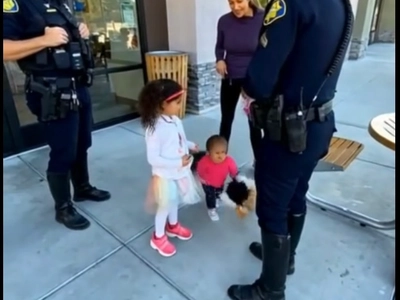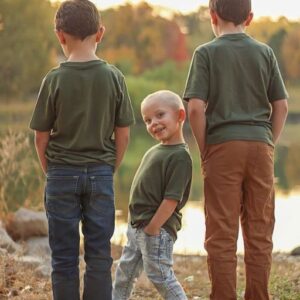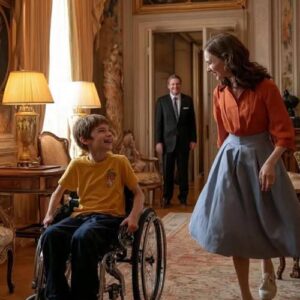
The plan was simple. A brief visit.
I required just five minutes in the coffee shop to collect my regular order—cold matcha tea and a pastry for the children. The girls waited directly outside the glass windows, entertaining themselves with their stuffed puppy while I watched them from inside. What could go wrong?
Upon my exit, I discovered two police officers crouched before them, speaking softly as if avoiding startling anyone. Nessa, my elder daughter, gripped the plush toy tightly with both hands, her expression puzzled as though deciphering a riddle. My younger child simply gestured at me as if I were the prime suspect.
An officer rose and stated, “Ma’am, your child placed a call to the emergency service.”
I stared in confusion. “She did what?”
The officer clarified that she had used the shop’s telephone—somehow persuading the employee that a genuine crisis existed. She claimed she required assistance because “someone suspicious” had stolen their puppy.
The realization struck me then.
Nessa believed I had given her stuffed animal away.
I attempted to dismiss this with laughter—attempted—but the officers remained serious. One knelt again beside Nessa and inquired, “What caused you to believe that person wasn’t your mother?”
She remained silent initially.
She then gazed up at me and spoke words that chilled my blood.
Words about events from earlier that morning—details I had shared with no one.
“Her ring was missing,” Nessa declared. “She also forgot the lunchbox joke.”
The ring lay on the bathroom counter because I had removed it while washing dishes after it slipped from my wet hand. The lunchbox joke—each morning while preparing their snacks, I pretended to pack a frog or secret mission instructions. That particular morning, I remained silent. I simply placed the sandwich inside and closed the bag without comment.
Words failed me. The officers began exchanging meaningful glances.
“She hummed a different tune too. Mom always sings You Are My Sunshine while tying our shoes. This morning brought something else. Strange.”
One officer spoke gently: “Children observe details adults believe escape their notice.”
My stomach plummeted beyond what I imagined possible. Nessa spoke the truth—that morning had found me completely altered. Significantly altered.
My thoughts centered on the letter.
The correspondence that arrived by mail the previous evening. The document I had concealed behind the spice container.
A woman called Mara had written it. A name absent from my life for fifteen years. A name that triggered full-body tremors and the sharp flavor of treachery.
Her words carried apology, expressing desire to “repair past damage.” Yet primarily, she described a daughter. Her daughter. Who could be mine.
My husband remained unaware. Not yet. I had barely acknowledged the truth myself. That letter fractured something within me. It created the sensation of being a stranger in my own home. In my own body.
Perhaps I did forget the ring. Perhaps the joke slipped my mind. Perhaps my humming sounded different.
Yet I never imagined my child would observe these details closely enough to contact the authorities.
The officers finally released us after confirming everything was safe. They praised Nessa for her courage, telling her she had taken “the correct action” by reporting when something seemed wrong.
The moment we entered our vehicle, I steered into a quiet parking area and faced them.
“Did you believe I was a stranger?” I asked softly.
Nessa lifted her shoulders, her small fingers playing with the toy’s ears. “You stayed silent. You also didn’t smile. Not like Mom.”
My younger daughter agreed seriously. “You seemed a bit scary.”
That expression—scary—struck me harder than expected.
I breathed deeply and stated, “I apologize for frightening you. Many thoughts occupied my mind this morning. Yet I remain the same person, darling. Forever the same.”
They agreed, though I detected doubt remaining.
Later that evening, after tucking them into bed, I remained in the kitchen holding the letter. The envelope showed creases from repeated opening, reading, and storing.
Mara explained she had been young. Under pressure. She never desired to surrender the baby, but her family demanded it. She claimed the agency withheld information about what occurred after the adoption. Until recently—when she spotted my photograph in a local newsletter.
I was apparently the sole “Emily R.” from our small New Hampshire community who fit the correct age, appearance, and timeframe. She requested a meeting. She insisted the girl—Aly—deserved to learn the truth.
Sleep eluded me that night. I remained on the sofa clutching my phone, studying her contact information.
Morning arrived with me still examining it when my husband discovered me.
“You rose early,” he commented, partially awake.
I parted my lips but produced no sound. Not then.
Another complete day passed before I revealed everything to him. The letter. Mara. The chance.
He remained silent for an extended period, gripping his coffee as though it contained solutions.
He finally asked, “Do you accept this as true?”
“Uncertainty fills me. One side wishes to deny it. Yet another side… recognizes the possibility.”
Several days afterward, I consented to meet Mara.
We selected a small park in the adjacent town. Public enough for safety, private enough for honest conversation.
She appeared older than my memory suggested. Weary. Gray streaks marked her hair at the sides, and she moved with a minor limp. Her eyes—those green eyes—remained identical.
We occupied a bench. Neither spoke during the initial minutes.
She then stated, “I came not to create problems. I simply… never ceased thinking about her. About you.”
She retrieved a photograph and offered it to me.
A teenage girl displayed dark curls and gentle brown eyes. Her smile appeared cautious yet kind.
“She has seventeen years,” Mara explained. “Aly is her name. She knows about my contact.”
I examined the photograph. My heart performed an odd jump.
“Does she wish to meet me?” I inquired.
“Fear fills her. She remains uncertain about the meaning. Yet I promised to ask.”
That evening, I presented the photograph to my husband. We examined it quietly. He eventually murmured, “She resembles Nessa.”
We both recognized it. The similarity was clear.
Weeks went by. I encountered Aly. Initially just we two, sharing hot chocolate. She displayed intelligence, caution, and posed thoughtful questions. I responded to everything truthfully. Even when pain resulted.
She eventually visited our home. She met my daughters. She met my husband.
Nessa attached to her immediately. “You share my nose!” she declared during their second meeting.
Aly chuckled, and tension within me relaxed.
Challenges existed always. Uncomfortable silences occurred, unexplained crying happened, and times arose when words escaped me. Yet gradually, we discovered our pattern.
One afternoon, Aly and I occupied the porch while the girls entertained themselves in the yard. She inquired, “Why did you never search for me?”
Honesty guided my response. “Because your existence remained unknown to me. They informed me everything was finished, that no concerns existed. Youth marked me. Innocence too. I allowed myself to forget because forgetting proved simpler.”
She acknowledged this. Silence followed for some time.
She then whispered, “Relief fills me that your forgetting stayed incomplete.”
Summer changed to fall.
One Sunday found us all at a farmer’s market. Aly accompanied Nessa, demonstrating proper peach selection. My husband purchased excessive honey sticks. I simply observed.
I observed this life that initially felt temporary, then gradually became deserved.
Later that evening, while tucking Nessa into bed, she gazed up and stated, “Happiness fills me that you seemed scary that day.”
I chuckled. “What reason?”
“Because Aly joined us now.”
Understanding struck me immediately.
Occasionally, fractures allow illumination to enter.
That coffee shop incident—the alarm, the bewilderment—exceeded mere misunderstanding. The universe grabbed my shoulders, forcing awareness upon me.
The letter could have been dismissed. Discarded. Ignored completely.
Yet I chose differently.
This choice provided a girl who spent years questioning with answers. My daughters gained an elder sister.
Life rarely arranges itself perfectly. Some elements arrive delayed. Others appear in unusual forms. This doesn’t diminish their rightful place.
Sometimes a child’s vivid imagination—or her devoted protection—reminds us of true priorities.
Family. Honesty. Fresh opportunities.
Has a moment ever altered your life’s direction completely—despite seeming minor initially? Express your opinions below, and remember to appreciate or distribute this account if it moved you.





